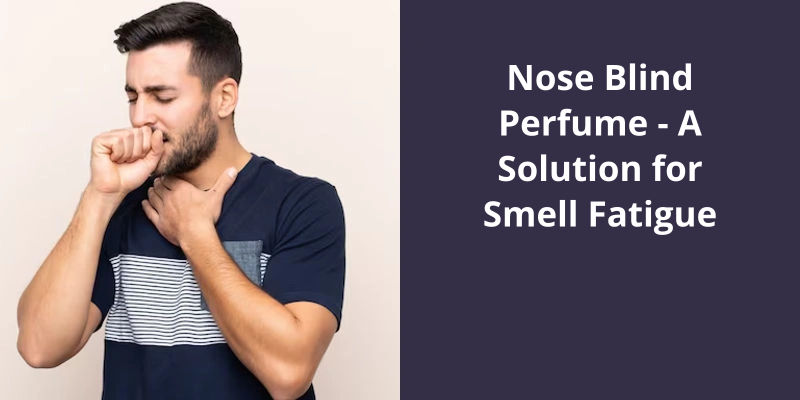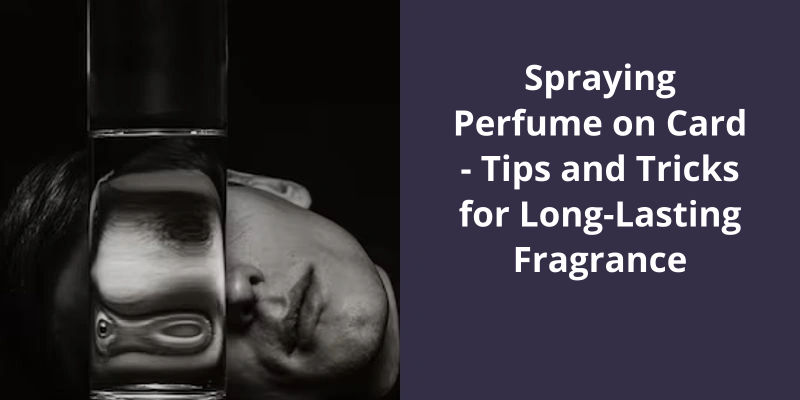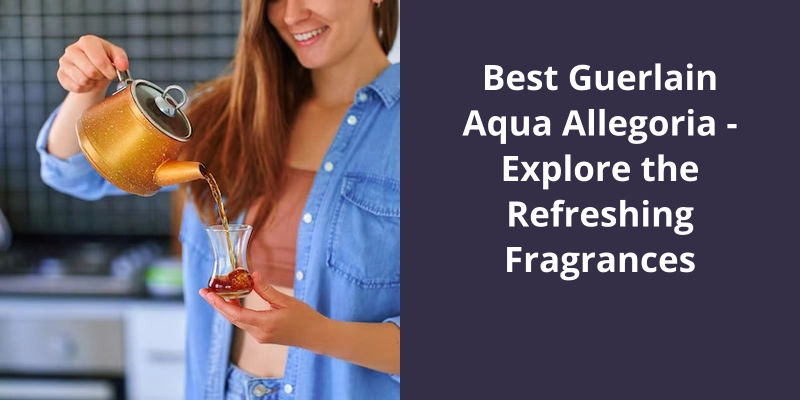Nose Blind to Perfume is a phrase used when someone can’t smell their perfume anymore. This happens mainly due to a common thing called olfactory fatigue. You see, our sense of smell gets used to the scent after being exposed to it for a long time. Therefore, over time, our nose starts ignoring the constant scent, causing us to become “nose blind”. We might think our perfume has worn off when it hasn’t. That’s why sometimes others can trace our scent, but we can’t. It’s not a major issue and is very common among perfume wearers. To overcome this, you can switch up your scents regularly or take a break from wearing perfumes.

Do You Become Nose Blind to Your Own Perfume?
The phenomenon of nose blindness has been studied for years by fragrance experts and scientists alike. It’s essentially a result of our sense of smell becoming desensitized over time to a specific aroma. The olfactory system is incredibly complex and can have an incredible memory, but our brains are also hardwired to ignore constant sensory input.
For perfume lovers, this can mean that a fragrance they love and have been wearing for months or even years can start to go unnoticed. It doesn’t mean that the scent has disappeared or that others cant still detect it, but rather that the individual has adapted to it’s presence. This can be frustrating for individuals who want to continue to experience the magic of a particular scent, but there are a few ways to combat this effect.
One approach is to take a break from the fragrance altogether. This allows the olfactory system to fully reset and to regain sensitivity to the particular aroma. Individuals will then be able to experience it again as if for the first time. This may prevent the nose from becoming too familiar with any one scent and can keep the experience fresh and exciting.
It’s important to note that nose blindness isn’t a permanent condition and can be overcome with some patience and intention. Perfume lovers shouldn’t give up on their favorite scents even if they feel like theyve lost some of their power. With a little bit of experimentation and mindfulness, the magic can be recaptured.
This is why it’s important to regularly change out ones air fresheners or to take a break from wearing deodorant to avoid becoming too accustomed to the scent.
With a little bit of intention and mindfulness, the magic of the scent can be recaptured once again.
Tips for Choosing a Perfume That Complements Your Natural Scent
Choosing a perfume that complements your natural scent can be tricky. There are a few things to keep in mind when selecting a fragrance. First, consider your skin type and body chemistry. Some perfumes may smell great on one person but not on another. Second, think about the notes and ingredients in the fragrance. Some scents may be too overpowering or not suitable for certain occasions. Finally, test the fragrance before purchasing it to make sure it works well with your natural scent. By following these tips, you can find the perfect perfume to complement and enhance your natural scent.
Now that we know the potential causes of nose blindness and the role perfume can play in fixing it, let’s explore some additional tips and tricks for getting the most out of your fragrance arsenal. By incorporating a few simple habits and techniques, you can ensure that your olfactory system stays sharp and engaged, allowing you to fully enjoy the scents around you.
How Do You Fix Nose Blindness With Perfume?
Have you ever experienced going into a room and smelling a strong scent, but then after a few minutes, you can’t smell it anymore? This phenomenon is called “nose blindness.”. It’s when your sense of smell gets used to a fragrance that you don’t notice it anymore even if it’s still there. This can be frustrating, especially if you want to enjoy the scent of your favorite perfume or air freshener. But don’t worry, there’s a way to fix nose blindness, and it involves using perfume.
Your wrists are a great place to apply perfume because they’re pulse points, which means they’re where your blood vessels are closest to the surface of your skin. The warmth of your skin also helps to activate the scent of the perfume, making it more noticeable to your nose. By applying perfume to your wrists, you can enjoy the scent all day without worrying about nose blindness.
Dont be tempted to apply too much as it will make nose blindness worse. It’s best to stick to minimal fragrance. Over time, your sense of smell will reactivate and you”ll be able to enjoy the scent of your perfume again.
You can start with a light body lotion, followed by your favorite perfume, and then add a mist of an air freshener in the same fragrance. This technique is particularly effective for people whose nose has become accustomed to a particular scent. By layering different products in the same fragrance, youre adding a new dimension to the scent that stands out more to your nose.
Nose blindness doesn’t happen overnight, so fixing it also takes time. You’ve to train your nose to differentiate scents again, and this can take weeks or even months. So don’t expect a quick fix with perfume but it’s the most effective method to retrain your nose to distinguish smells. Be consistent in using perfume on your wrists, change your scent if necessary, and layer different products.
Tips for Choosing the Right Perfume for Combatting Nose Blindness
- Choose fragrances from different olfactory families
- Test perfumes on your skin, not just on paper strips
- Avoid wearing scents that clash with your body odor or the smell of your environment
- Consider the occasion and time of day when selecting a fragrance
- Take your time and don’t rush the decision
- Ask for recommendations from friends, family or perfume experts
- Invest in high quality fragrances
As our sense of smell is an essential part of our everyday lives, it can be troubling when we suffer from nose blindness. Also known as olfactory fatigue, it can occur when the nose is exposed to a particular scent for an extended period, causing the brain to stop registering it. To learn more about this phenomenon and how it can affect our daily lives, read on.
What Does Nose Blind Mean Urban Dictionary?
This term is often used to describe a situation where someone has been exposed to a particular scent for an extended period of time, such as a pet owner who doesn’t notice the smell of their own pet. It can also refer to a broader range of situations, such as someone who lives near a factory and no longer notices the smell of the pollutants being released into the air.
Nose blindness is a common occurrence and can be a problem in many situations. For example, it can be a safety hazard for people who work in industrial environments, as they may not be aware of the hazardous smells that are present. It can also be a health problem for people who live in areas with poor air quality, as they may not be aware of the pollution that’s present.
There are several ways to combat nose blindness. One way is to take breaks from the scent, such as going outside for fresh air or taking a short walk. Another way is to use scents that are different from the one you’re used to, such as using different room fresheners or perfumes. It’s also important to regularly clean and maintain the areas where the scent is present, such as cleaning the litter box for a pet owner or using filters to reduce pollutants in the air.
In addition to physical smells, nose blindness can also apply to other senses, such as taste and touch. For example, someone who eats a lot of spicy food may become accustomed to the heat and no longer notice it, or someone who’s a lot of rough surfaces in their environment may no longer feel them.
It’s important to be aware of this and take steps to combat it, such as taking breaks from the scent, using different scents, and regularly cleaning and maintaining the environment. By doing so, we can improve our safety, health, and overall sensory experiences.
While we all love to smell great and carry our signature scent, have you ever wondered why you stop smelling your own perfume after a while? It’s not just you, and there’s actually a scientific reason behind it that many people may not be aware of. Nose fatigue, also known as olfactory adaptation, is a common phenomenon that affects our sense of smell and can impact the way we experience the world around us. Let’s take a deeper dive into what nose fatigue is and how it works.
Do You Go Nose Blind to Your Own Perfume?
The olfactory system, or sense of smell, plays an important role in our daily lives. Humans are capable of detecting a wide range of smells, from the delightful fragrance of flowers to the pungent odor of garbage. However, there’s a condition called “nose fatigue” that can occur when we’re exposed to a particular scent for an extended period of time. It’s a phenomenon where we become unable to detect a scent that we”ve been exposed to for a period of time.
Have you ever noticed that you become used to a scent that you’re constantly exposed to, like the smell of your own perfume? This is because your olfactory system naturally adapts to the scent you’re smelling, leading to what’s called nose fatigue. But don’t worry, this doesn’t mean your perfume is bad. It simply means your nose has grown accustomed to the scent.
The more molecules that are present, the more quickly your nose will become saturated with the scent. This is why it’s important to apply your perfume in moderation, and to avoid wearing too much of it in a confined space.
By understanding how our olfactory system works, we can better appreciate the fragrant world around us.
The History of Perfume and It’s Significance in Different Cultures.
- The Egyptians were the first to use perfume dating back to 3000 BC. They used natural ingredients like lily, frankincense, myrrh, and cinnamon, to create fragrances for religious ceremonies and burials.
- The Ancient Greeks also used perfume for religious ceremonies, but it became popular among the wealthy for personal use as well. They created fragrances using natural ingredients like flowers, herbs, and spices.
- The Romans used perfume for both personal use and in baths. They created fragrances using ingredients like lavender, rosemary, and thyme. They also used scent to cover up unpleasant odors in crowded cities.
- In the Middle Ages, perfume-making shifted to the Middle East and Europe. Perfumers often mixed fragrances with oils to create long-lasting scents. Lavender and rose became popular scents during this time.
- The Renaissance period brought a renewed interest in perfumes, especially in Italy and France. Perfumers began mixing fragrances with alcohol to create lighter, more refined scents. Musk and amber became popular in this era.
- Today, perfume is a multi-billion dollar industry, with fragrances produced and sold worldwide. It continues to hold cultural significance, with it’s scents used for personal pleasure, religious ceremonies, and special occasions like weddings and funerals.
Source: How do you prevent yourself from being noseblind to your …
For those who’ve been in their homes for an extended period of time, it’s not uncommon to become nose-blind to certain smells. This phenomenon of becoming desensitized to smells around us can make it difficult to identify unwanted odors. However, there are ways to diagnose nose blindness, and the best one comes from the insight of someone else trusted. According to Dr. Dalton, inviting a guest to your home can give you valuable feedback on the smells you may have become nose-blind to.
How Do I Know if I Am Noseblind?
Noseblindness is a term for the condition when we become desensitized to smells in our environment. It can happen when we’re exposed to a scent for a prolonged period of time or when the odor is minimal. The scary part is, most of us aren’t even aware of this condition until someone points it out to us.
For example, if your home has a pet, and you aren’t smelling any pet odor, there’s a good chance that you’re noseblind. The same applies if your home has a persistent smell of cooking, and you cant smell it anymore. Also, if you find that you’re increasing the amount of air fresheners you use, it’s possible that you’re becoming noseblind.
Another way to determine if you’re noseblind is to observe the reactions of others. It might be that you’re so accustomed to the scents in your home that you no longer pick them up, but others do.
If you’re someone who loves perfume but can’t stand the strong scent that lingers even after you’ve left the house, you’re not alone. Luckily, there are several simple ways to get rid of that scent. One of the most effective methods is to use baking soda, an old and trusted remedy that can help eliminate that lingering perfume smell without the need for alcohol or other harsh chemicals.
How Do You Get Rid of Perfume Smell Without Alcohol?
How do you get rid of perfume smell without alcohol? This is a common question among people who’re sensitive to strong odors or those who want to avoid using alcohol-based solutions. One solution that’s been found to be effective is the use of baking soda. This natural substance has been used for many years to eliminate unpleasant smells from clothes, carpets, and other surfaces.
To use baking soda to remove perfume smell, you’ll need to make a paste with equal parts of baking soda and warm water. Mix the two ingredients until you’ve a thick, smooth paste. Then apply the paste to your skin, making sure to cover the affected area thoroughly. Leave the paste on for a few minutes to allow it to absorb the oils of the perfume.
For example, you could try using a combination of vinegar and water. Mix equal parts vinegar and water and then apply the mixture to your skin. The vinegar will help to neutralize the perfume smell, leaving you smelling fresh and clean.
It’s natural, effective, and easy to use.
Conclusion
Finding ways to refresh your olfactory system, such as switching up your scent or taking a break from fragrance altogether, can help re-sensitize your nose and allow you to fully appreciate the nuances of different perfumes.





